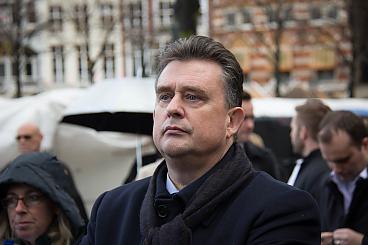The answer to discord is unity
The answer to discord is unity

'We won’t allow ourselves to be driven apart. Dutch citizens, men and woman, Muslims and non-Muslims, have shown over the last few days: our answer to division is unity. The cowardice of terror will never defeat the resilience of a free society.’ So said SP leader Emile Roemer during Thursday’s debate on the attacks in Paris. Below you can read the text of Roemer’s speech.
Last Friday Europe was struck in the heart. ISIS executioners hit the Parisians in the most frequented place, in the heart of everyday life, the life of freedom, the world in which we think ourselves safe. This attack struck in Paris, but hit the entire world.
Days before the attacks in Paris, the ISIS bombs exploded in Beirut. Forty-three people fell dead. At the end of October, 224 people died in Sinai after a bomb brought down their aircraft.
Paris mourns, Beirut mourns, and we mourn with them. Our thoughts go out to all victims of the terror and all those close to them that they left behind.
These attacks make some people fearful, because the terror is coming ever closer. And people expect politicians to react, that we will do everything we can to guarantee their safety. That we will introduce stricter border controls if the threat compels us to do so. That we will invest in the police and the security services if these professionals tell us that this is needed. And that we in any event don’t cut spending on security, as the government says that it plans to.
We can, and therefore we must do more to improve our security and resilience.
Perpetrators of attacks are often known to the security services. Cooperation between these services in Europe is invariably inadequate. Is the Prime Minister prepared to exert political pressure to improve this cooperation?
We know what we can do to tackle radicalisation, but resources are insufficient. Our police officers are the eyes and ears of society, but in many neighbourhoods understaffing means that radicalisation isn’t seen and extremism isn’t heard. When will the government at last unequivocally provide sufficient means for the police and for the courts?
One of the breeding grounds of terror can be found in the neighbourhoods which have evolved into parallel societies, where segregation instead of integration has become policy, often with unequal opportunities, poverty and discrimination and exclusion as a result. This can be seen in the suburbs of Paris, but segregation is also visible in our country. Why isn’t the government doing anything to counter it?
Teachers, youth workers, police officers and local sports coaches want to do more, but as things stand are receiving insufficient guidance in recognising and dealing with radicalisation. Is the Prime Minister prepared to acknowledge this and come up right away with proposals to improve it?
In the debate after the horrible murders at Charlie Hebdo and a Jewish supermarket I recounted the story of Abdul, the nineteen year old from Maastricht, an ordinary young lad seized by the ideology of hate of ISIS. He blew himself up in Baghdad, taking more than twenty people with him into death.
That is what radicalisation does.It makes young people into murder machines. And I see it as our task to seek to know how that can happen, how to get hold of it in time and how to prevent it.
The SP asked the government some time ago to list what it knows about the network of Jihadists, and to tell us which Salafist organisations may be involved in our country in clandestine preaching and in the organisation of violence. I repeat my question to the minister: is he prepared to establish a list of this sort of organisation and to make it public.
You cannot look at the rise of ISIS without looking at the conditions under which these extremists have seized their opportunity.
At how the illegal war in Iraq promoted extremism and the birth of ISIS; at how for years minorities in Iraq have been excluded and discriminated against by the country’s government. At the chaos created in Libya. Fifteen years of military interventions with no positive solutions have proved counterproductive.
ISIS must be tackled. But the SP doubts whether raining bombs on to ISIS-controlled areas will reduce the chance of attacks in Europe. Logic fears the opposite. A financial blockade would, on the other hand, undermine ISIS’ ability to strike and reduce its support amongst the population. ISIS earns millions of euros from the sale of oil smuggled by others via Turkey. And why aren’t arms exports to this region dealt with? Currently the US is once again selling $1.3 billion in weaponry to Saudi Arabia.
Rich Arabs from Saudi Arabia, Qatar, the United Arab Emirates and Kuwait continue to transfer huge sums of money to the extremists. This is the oxygen which keeps the terrorists going. As long as we don’t sever that, we’ll never stop this.
Many people, from all denominations, have expressed their views over the last few days. And in amongst all the bad news that’s a message which offers hope.
We won’t allow ourselves to be driven apart. Dutch citizens, men and women, Muslims and non-Muslims have shown over the last few days: our answer to division is unity.
I’ll conclude with an appeal to be alert, to prevent the breakdown of our society. The cowardice of terror will never defeat the resilience of a free society.
